[I write this article on an eastbound train, running on about two hours of sleep. My sincere apologies for not writing sooner — Wi-Fi has been scarce and my travels have been strange. I hope what I’ve put together here proves to be a worthwhile and not too terribly convoluted read. Thanks for your support.]
“Headin’ back east!” – these are the words that bring some men profound comfort; the frugal men of the wizened, haggard, ancient hills where Yankee Doodle Dandy still hums in the heads of the doddering elders. Where maple syrup and thick blankets of fog preserve a man from the bleak delirium of elsewhere.
And in the US, one such ‘elsewhere’ is the West, what with its harrowingly ‘open’ country. The West is a world of radical newness – a world of polystyrene and asbestos, of vinyl and gasoline. To the true ‘Yank’ the West’s visual perfection often strikes him as if it were a bizarre simulation; its pornographic vistas overlooking extremely neat-and-tidy worlds of curbs and cul-de-sacs and highway interchanges; the whole ensemble seems altogether inadvisable, naive, voidlike. Without the patina of age, wisdom is absent in much of the West, and a feverish and perverted waking dream seems to touch everything under its king-size skies.
Should a Northeasterner foray into the Western skies, he either falls under their spell, blustering his praise from sunburned lips, wedding himself to the buttes and cuestas and canyons and realms of redwood – or he shudders and returns home. And even those hearty eastern boys who wander west with love in their eyes will eventually shudder, too, and some may even head home for good. For the West is inhuman, surreal – that whole portion of the American nation feels to be a damned trick.
Saddling up, cowboying up, riding that westbound train as she rattles over the dusty, windswept rails – all of it provokes a display of vigor and vitality in a lad who may hearken from the Greens or the Whites or the Adirdonacks. But the old West will take all that piss and vinegar and pour it down a dry, sandy draw. It dumps out on the sawdust floors of taverns, or into the San Francisco Bay, or it is ignited in the neon skylines – burnt to vapor in casinos and highway wrecks and crackpipes.
The hickorylike vitality of the Northeasterner was the seed from which Western aplomb sprang – our nutcase ramblers and derelicts wandered ‘out there’ to lead a life of damnable aimlessness and foolhearty pining for riches that probably wouldn’t be found. All that awaited our westward transients was liquor, expensive groceries, and demon-struck whores. At day’s end, a handful of them won big, but these were the exceptions – the ranch-kings who stand above their desolate arroyos with rifles. The sherriffs and mayors – who began a long tradition of government employment in the West – and the casino-men and brothel mistresses and shrewd Chinese laundrymen who all built their empires. And now, the developers. Western society is heavily stratified – and in a great many cases, the descendants of old desperadoes remain desperate and wandering, as if caught in a curse of blood.
And their world is completely surreal. Tweakers, perverts, punks, skinhead Nazis, narcotrafficantes, Juggaloes, carnies – some station themselves in Motel 6 rooms and clench their pints beside the gas station slot machines; others are in a drugged-out underworld of turf wars, plastic baggie dust, and zombified wenches in polyester mini-skirts. On the Boulder Highway in Nevada, I’ve seen sex-trafficked, Fentanyl-addicted women literally foaming at the mouth. In California, I’ve seen men with machetes, faces painted with clown paint as they gear up for retribution over some incomprehensible violation of honor. Men with Swastikas tattooed on their bare chests – posses of warlike and brutish men for whom the sociology of the prison yard has boiled out onto their home streets forever.
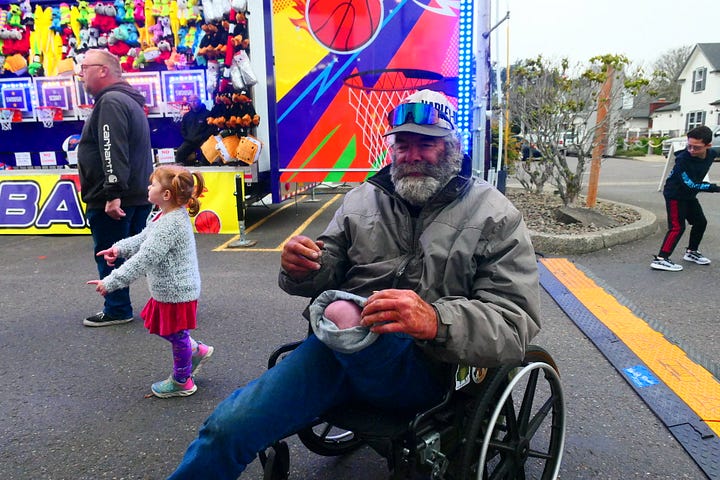

The old ‘Wild West’ never died – it only hypertrophied, metastasized, it was sent into hyperdrive by cocktails of insane drugs, mind-numbing class stratification, and intergenerational desperation.
This is the world of my father. And by extension, it is the nebulous world from which my own genesis took root. For in the economy of west coast desperation, there are blunt-wraps and cans of malt liquor, there are heinous beat-downs with bloody lengths of steel, there are cold-cash street politics and motel rooms and Greyhound bus tickets to hell-knows-where. But there is also the fuck – the paroxysm of corporeal ecstasy found in furtive corners, the sort whose innate sacrality is banished or hidden or smacked numb. Shrouded in the dark fugue of frustrated dreams, race war, the hunger for money or liquor or meth, the world of tribal allegiances and lying whores, two bodies grope toward one another on a squalid stage, abandoning marriage or the metaphysics of the soul and its creation – to slip into the tent with no more than the most tenuous ‘strings attached’.
That such unions are capable of producing life is an afterthought at best – an inconvenience regarded with no sentimentality. Coathangers and clinics, shoplifted pills capable of ‘taking care of it,’ methods of management of every mammalian fluid and hormone related to human vitality and hope and creation – or worse; kicks down the stairs, accusations of lies, courtroom paternity tests, black eyes, and midnight tickets out of town.
Perhaps the Sexual Revolution had unintended consequences. For though the underclasses of every civilization under the sun have never been strangers to the fuck by any means, and bastard children have been born in every society in every era – the Sexual Revolution was novel in a number of respects. Its architects were the well-heeled children of the academy; they had been ‘born, bred, and cookie-fed’ for the task of leading nations toward honor and vitality and even edification – but in the 1960’s and 70’s, they seem to have abdicated their collective throne all at once. Whatever noblesse oblige once drove the intellectual class to exhort all members of society toward honor, marriage, decency, and the sanctification of human life — simply withered. In its place, a personalistic morality rose – one in which human life is devoid of metaphysical content, one which shrinks the sex act down into a repetitious, anonymous, candylike thrill. To them, the intuitive merit of the family unit was disposed of as an article of repressive, outdated, antiquarian theocracy.
Those who laid the groundwork for this dismal development in the modern cultural history of the West were overwhelmingly well-off – and therefore financially equipped to ‘mop up’ whatever unfortunate messes their disordered experiment might’ve produced in their own lives. They were also overwhelmingly young, driven by a fundamentally Oedipal and revolutionary sense of disaffection for the old, structural-functionalist order of Western Civilization and America. A rejection of patriarchs and ancien regimes, a nullification of oppresive elements of natural order – a revolt against the father, not only God the father, but fatherlike agents of stability. This included, in many cases, their own fathers.
And so it was that the rejection of fatherly order and paternalistic benevolence gave rise to a more literally fatherless generation. Where once the originators of the Sexual Revolution might’ve replaced nuclear families with something sentimental, idealistic, hopeful, or positive – the thrust of the thing ultimately was to destroy the family as a central component of the Western identity and to supplant it with nothing. And in the realm of anthropology: where there is nothing, both suffering and nihilism seem to crop up as plentifully as noxious weeds in a vacant lot. So went the great ‘free love’ experiment.
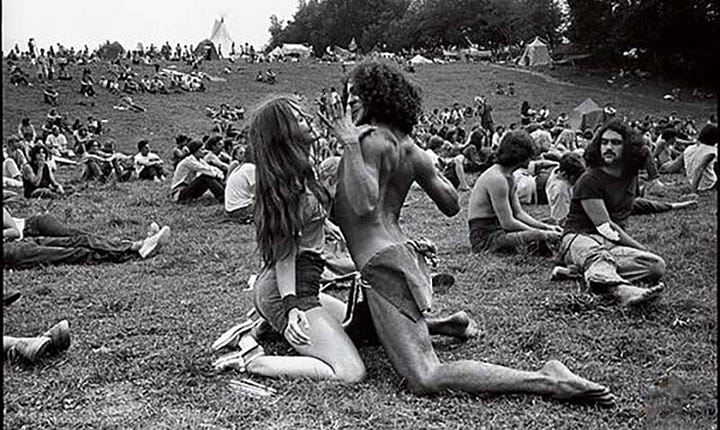
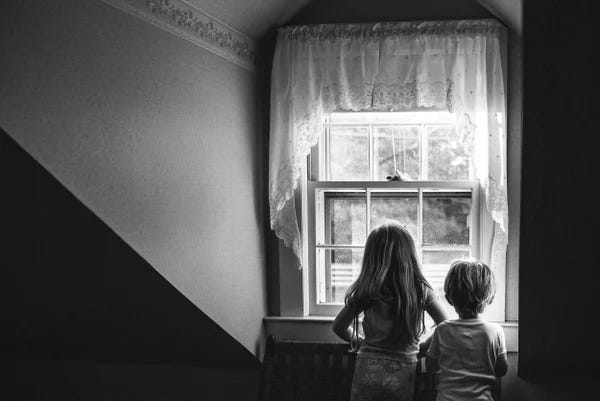
Above all it seems that the exponents of sexual ‘liberation’ failed to consider how this grandest of social experiments would permanently ravage our impoverished underclass. Among the poor, the desperate, the violent, the itinerant, and the wounded – idealism is often a strictly unaffordable luxury. For the poor, the Sexual Revolution ultimately only accelerated some of the worst traits of those on the margins – spurring them toward copulating without compunction, toward thoughtless fornication, toward abortion and violence, and ultimately – toward the birth of the most needlessly fatherless generation in the history of Western Civilization. That these developments would precede the years of crack cocaine, inner city blight, a return of ghastly levels of racial tension, and more abysmal developments in the history of the American poor would only worsen the situation.
For, in earnest, the Sexual Revolution was only a corollary of a larger shift in the culture of Western Civilization – that of modernism. The modernist applies the corrosive of reason to every established order, however obtusely, exposing their arbitrary hypocrisies for the mere deviltry of it and little more – proposing replacement ideas which could be erected to supplant the superstitious world of Popes and governments and father-knows-best families. Few seemed to take root in a lasting way, and the net result seems to have been that we’ve developed a large-scale addiction to novelty. From R. Mutt’s sideways urinal and other ‘modern art’ to the Beatles in India to transgenderism and hashish-smoking – ever since our feverish entrance into the twentieth century, Euro-descendant Westerners have had an insatiable hunger for whatever is new, revolutionary, and often shocking.
Perhaps the pinnacle of corrosive, ultra-modern novelty-seeking was found among the punks. The core tenet of the punk ethos is to say “no” – it is to reject false gods, to throw oneself whole to the wolves, to become a shocking spectacle to whom nothing is sacred or offensive or transcendental. Among them, one G.G. Allin comes to mind as the patron saint of this world of shock and idolatry – a man who grew up in a conservative religious group in Northern New Hampshire. His actual name was Jesus Christ Allin, but his little sister couldn’t pronounce it well, and simply called him “G.G,” a name he adopted as he ascended to fame as one of the most shocking acts in the history of punk rock. The lyrics of his song Outlaw Scumfuck go something like this:
“Everybody knows that I’m a scumbag // They won’t come and see me at this dive // Everyone’s afraid, of what might happen to them // Or if they’ll even get out of there alive // ‘Cuz I love to drink, whisky by the gallon // And live on peanut butter sandwiches I don’t care // I spent some nights in jail, in this ‘ol country // Everybody hates me and I just don’t fuckin’ care… // ‘Cuz I could sing all them songs about bitches // and I still fuck all the prostitutes that I know // They tell me I smell like raw sewage // But I’m the man that you’ll never know…”
Allin was known for committing extreme acts on stage, including cutting himself, defecating, covering himself in bodily fluids, and engaging in ad hoc sex acts during live shows. In 1993, he died of a drug overdose at the age of 36. Perhaps no one exemplified the ethos of punk – and perhaps even the ethos of modernity – quite as thoroughly as G.G. Allin.
That such an act as his could ever rise to popularity should stand as a metric of the profound disillusionment of a generation who’d already tasted the first fruits of the ‘bastardization’ of American youth. To the early punks, there was only now, there were no promises made – theirs was a ‘live fast, die young’ maximalism that served as an antidote to cultural collapse where ‘buying in’ meant embracing homogenous consumerism, purposeless overseas warfare, and the stifling, one-size-fits-all moralism of mid-century careerism and family. During this era of revolt, countless subcultures emerged which sought to afford their adherents something that felt ‘real’ – some kind of extreme authenticity that might serve as an antidote to the boring void of post-WWII American life at practically any cost.
Many who entered into these milieus in search of authenticity were in the most fertile years of their lives – but the extreme authenticity of birth, marriage, and parenthood was, for many, not ‘punk enough’. It smelled too much like the stifling paternalism of their forebears – and yet the sex was wild indeed.
Tens of thousands of children would be conceived by parents for whom the idea of a pregnancy was seen as a ghastly inconvenience rather than a blessing. Countless infants would wind up in the biohazard dumpsters of abortion clinics – and many more would find themselves in the homes of grandparents, uncles, aunts, or foster care facilities, wondering who the hell they really are – and where on earth one or both of their parents might be.
The trip north from Texas had been a rolling fugue-on-rails; a blustering, swinging ride across a California that seemed at once vibrant and listless. I was traveling, yes – but after Texas, the traveling changed into something else. My journey up the West Coast on rails was at once a jubilee from Eastern obligation and boredom, a pre-marital ‘rumspinga’, a retrospective of my hobo years, and – as I forged north to Oregon, the journey I had always dreamed of taking to finally meet my estranged father. A weird gravity set in, and I began to feel exceedingly strange.

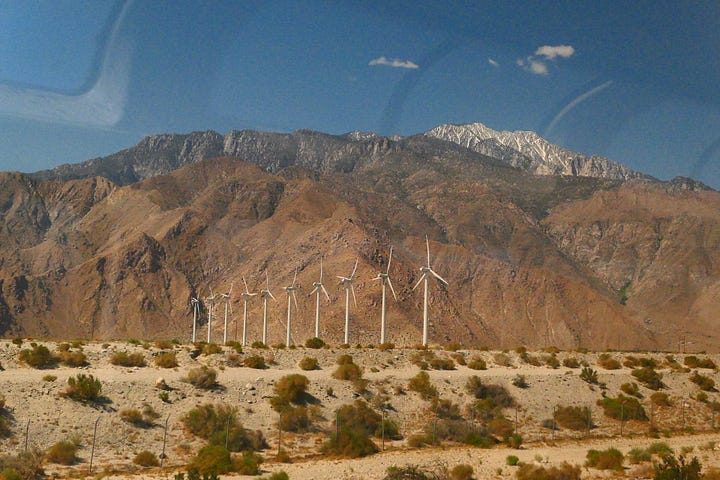
I had wanted to write, but could write nothing. I had wanted to socialize, but did so halfheartedly. A certain nervousness crept over me with every northward mile regarding the interaction I was about to have with a man whose name I had only learned a handful of years ago. I could only gaze out the window at the passing tunnels of trees and at the hulking mountains and little logging towns, and in due time, I realized that I was standing beside a posse of methheads at the Safeway grocery store in Florence, Oregon – receiving a text from ‘Father’ that he’d be there in five minutes. The Ferris Wheel was visible in the distance – he had probably been the one to drive it up here from Medford to assemble it.
That my estranged father would quite literally be an itinerant carnival worker – better known as a ‘carnie’ – has struck me as a flambouyantly absurd biographical note. The story is bizarre to the point of being patently unbelievable, and in fact, in relating it to others throughout my life, I have occasionally been accused of lying. But it is the certifiable truth that my father has done almost nothing but work at traveling circuses, Rennaissance Faires, and carnivals for the better part of forty years. My parents met in 1993, when she was stationed as a lowly Seaman at the US Navy Weapons Station near Long Beach, CA, and he was working at the traveling Rennaisance Faire. She visited, and the two of them had a relationship for a few months.
In those days, he was in the habit of painting his naked body blue with Celtic woad in the Pictish style, and of carrying a sword and quaffing mead from a Norse-style drinking horn. He slept his nights in period-correct canvas tents, hollering in Middle English, re-enacting some ancient memory in his bones of the lives of our Highlander ancestors – albeit in 1990’s Southern California. He was a punk and a rebel with a certain flair for criminality; he met my mother less with courtship in mind and more with the idea of re-enacting a period-correct tryst with an alewife in a Medieval borderer village.
And, in keeping with historical authenticity, they soon found that one thing from the period of time that Rennaisance Faire workers spend their lives depicting has remained true: that if a man should take a waif into his tent, she may well conceive a child – and in a perfect flourish of historical accuracy, that is exactly what happened. My soul would’ve found its earthly home, loosed from the wyrds of old Highland blood and into the living world where spirit meets flesh – sometime in high August of 1993.
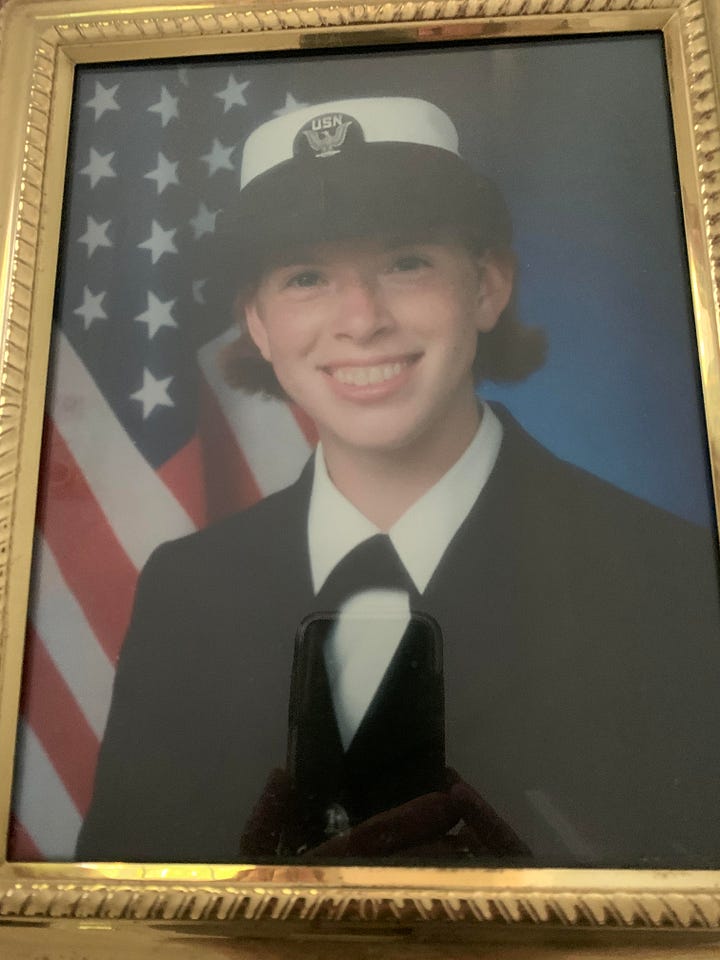
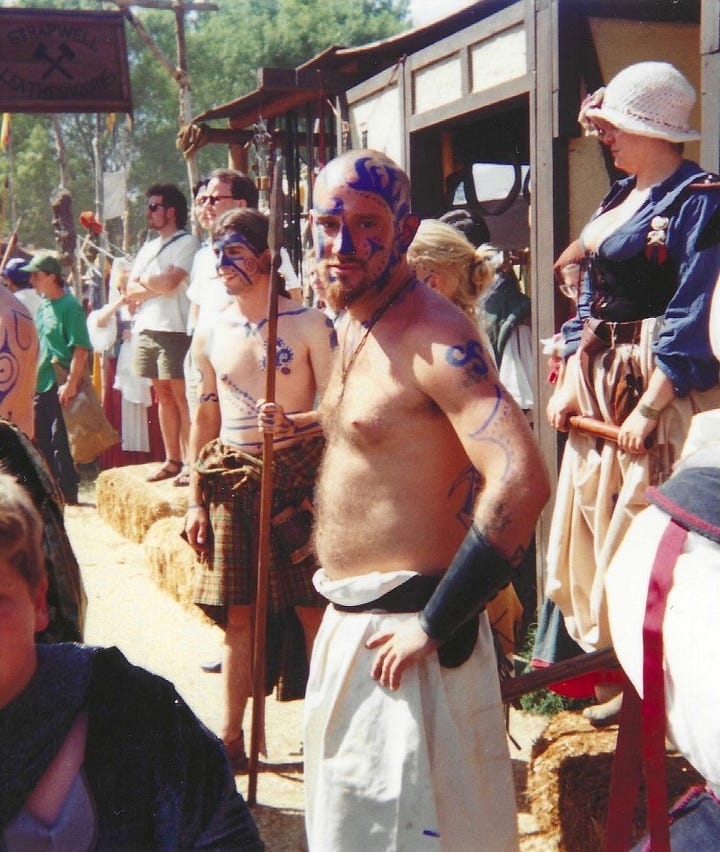
Shortly after, my father went to county jail on one charge or another. My mother had to visit him there to inform him that he had indeed sired a child – the child who she’d happened to bring along for the visit in her womb. And as he blustered and cursed and revolted against the possibility that he could indeed be the father, I swam in ectoplasm, a sleeping little being, a tiny soul who wouldn’t ever stand before him in living flesh for thirty years.
When he was released, my mother met with him again, repeating to him that he would be a father. This time, he kicked her, and she got into her car in a blind rage, swerving about the streets of Long Beach, California – attempting unsuccessfully to kill him with her car. He fled, and insofar as I have been able to tell, he was not seen again.
On May 24th, 1994, I’d be born. Shortly thereafter, I’d be baptized, fittingly perhaps, at Our Lady of Sorrows Catholic Church in Vestal, NY. That week, my father would be shooting methamphetamine intravenously for the first time, and by the time I was crawling, he’d be an accepted member of the White Aryan Resistance.
This gang – often known simply as its acronym, WAR – is a Nazi skinhead gang that was then a formidable force on California streets statewide. He’d read The Turner Diaries – an infamous racist novel that ends with the ‘day of rope,’ when all ‘race traitors’ nationwide would be hanged, and nuclear hellfire would be used to cleanse the United States of its nonwhite blood. He’d visit the Aryan Nations compound in northern Idaho and convert to a form of Volkisch paganism known as Odinism. And he’d get an SS-style Nazi thunderbolt tattoo on his neck.
White Power gang politics, traveling circuses, and liquid methamphetamine would dominate his life for nearly ten years. Fatherhood, however – would not.
And then, on May 15th, 2024 – more than thirty years since he’d last laid eyes on my mother and I – he arrived at the Safeway, where I was eating honeydew and listening to a methhead’s idiotic rant about aliens and ‘asiatic jawlines’. He — my father — came limping toward me like an exhausted buzzard, hobbling in his overalls on his worthless, gout-stricken leg. His gut rose up and down as he breathed; he looked exasperated and vaguely humiliated. The straps of his overalls bore the load of his immense gut at full capacity, tighter than a trucker’s ratchet-strap — he looked like an alcoholic, ex-con version of Super Mario. I reminded myself that he is my father — that this is the man I have wondered about for thirty years. After a quick, nervous glance, he reached out to shake my hand.
“Well, I don’t really know you, but I guess you can get into the car.”
I was shown to my accommodations – a manzanita bush in a field on the edge of the carnie encampment. There were trailers and gas grills, trash piles and canvas market tents, Guatemalans talking on flip-phones, Mexicans smoking cigarettes, toothless old white guys ambling around. Big rigs were idling, walkie-talkies were beeping, and my father looked like a lost child in the grocery store – he wasn’t sure if the boss would take issue with my being there. But his wife talked him through it, had him call the boss, and in time, I was shambling down a gauntlet of rough-looking men – I must’ve shaken hands with forty guys who already knew me by name.
“¡Bienvenidos, compa!” and “Glad to finally meet you bro!” rang out all round, until a slight, wispy guy from Veracruz leaned over and informed me of something I already knew – “You know my friend, we call your father ‘Señor Panocha’ – you know what that means bro?”
And of course I did. Early on in reconnecting – or, connecting, as it was the first time – with my father via Facebook and later telephone, he proudly informed me of this nickname. He didn’t need to tell me that ‘panocha’ is Mexican slang for a woman’s genitals – and that “Señor” sounded quite like “seen your” in English. It was hard to tell if they were giving him a macho title of humorous respect – or if they were calling him a pussy.
Then, I situated myself at the manzanita bush. “There’s a bunch of pallets there for ya, I got you all set up – watch the sand fleas,” my father said. I strung up a tarp, put on a sweater, and a man I hadn’t met yet thrust a 24-ounce can of malt liquor into my hand – a libation that I would soon learn was omnipresent at the camp. A night of heavy drinking began, and my conscious mind rose out of me like a spirit – returning only at dawn, when I rose from my pallet and shuffled down to the carnival in its opening hours.
Each time my father saw me walking the carnival, he seemed to be caught off-guard that I was still there. Perhaps this was because he was working — though whatever his work exactly is, I cannot discern. I see him mumbling into a radio, occasionally wandering around, now and again dressing down one of the ride operators. I watch him hobble up to one and bark obscenities at one. He returns to a bench hidden beside the Monkey Maze, plopping himself down with a pained moan. He sits awkwardly and wordlessly beside me, furtively taking gulps from a tall can of malt liquor and putting a seemingly endless stream of nicotine pouches under his haggard, sun-tanned lip.
“Holy fuck,” he’d say, apropos of nothing, as if exclaiming “Mama Mia!” randomly and without reason. Or, almost as frequently: “This is the year I’m gonna quit. The bossman’s a fuckin’ retard.” And then, as if he’d forgotten who I was or why I’d come, a vague sense of obligation propelled him to say things like: “So what else do you want to know?”
His affect was almost inpenetrably cavalier — he seemed like a man who’d seen and done it all, didn’t give a shit about any of it anymore, and couldn’t quite tell why he was even still alive. His life of punk-rock novelty, senseless violence, and hit-and-run fornication seemed to have caught up with him on the metaphysical plane — leaving him in the ill-fitting shell of a tired old man. A long-lost son of his returning to him for the first time was nothing crazy — by how he carried himself, I couldn’t help but wonder if he thought anything of it at all. There wasn’t all that much I “wanted to know”. Instead, we talked about carnivals.
“Clowns are all fuckin’ perverts and fags. Never seen a sicker group of guys in my life. One of the guys at a circus I used to work with had some kind of breakdown in Nebraska — he raped the guy who did the funnel cakes, beat him with an iron pipe and left him for dead. Thought he was in prison until he messaged me on Facebook the other day askin’ for a job — I said ‘fuck no, man!’”
The boss came around, and my father had me shake his hand. One might imagine a carnival boss to be a Willy Wonka sort of character — the bright-eyed and jocular king of a ‘world of pure imagination’. But no such luck. This guy looked like a methhead; his voice was ghastly and hoarse. His teeth were worn down like a goat’s.
“If you came here to soak this motherfucker for money,” he hissed through his glassy, sharp teeth, “then think again — because this fuckin’ guy don’t have any!” A volley of stiff, tense cackling ensued, the prolonged, yellowing cackles of fiendish, desperate husks of men. I feigned a cackle, forcing myself to laugh along at what amounted to a bizarre perplexing tableau. I eyed my father’s Nazi thunderbolt neck tattoo, and as I looked beyond him, I saw two young twin girls, eating cotton candy, falling down onto the asphalt in peals of innocent laughter. Here I was — finally in funland with my old man.
“Here, take this shit and go to Safeway. Get me two Steel Reserve tall-cans. You can get two for yourself if you want.”
There it was: the first thing I’d ever gotten from my father. A wad of greasy dollar bills, a beer run order, and even the incredible luxury of two 9% alcohol 24 ounce cans of shitty malt liquor free of charge. Steel Reserve is the national beverage of hardcore alcoholics nationwide — a thick, sweet, disgusting fluid, the sort of thing one drinks only if they’ve done the math regarding bang for your buck — and the man was certainly looking for his daily ‘buzz’.
Night began. Layers of thick, dark fog rolled in off the Oregon coast, shrouding the emptying rides and games in weighty layers of mist. The carnival was morbidly empty — but the show went on. The neon lights of the Gravitron looked hazy and dreamlike in the mist, and the humid chill began to cut through the wool of my sweater. We wedged ourselves into a fetid corner between the Tilt-o-Whirl and the Monkey Maze, cracking our cans open and slugging them down without a word of conversation. “The Chicken Dance” blared on the speakers.
It was among the most surreal moments of my life.
“Here,” my father said to me. “Take these if you want ‘em.” His expression was completely blank. He produced three complimentary Midway tickets, pressing them into my hand. Perhaps he imagined that I’d like to ride the Ferris wheel alone in the dark fog. I guess it might’ve been more enlivening than wordlessly drinking malt liquor with him in a squalid corner next to the Monkey Maze.
This was the apex of this quest – the wordless guzzling and worthless tickets, the drunken half-sleep on my pallet in the bush, the blank stares and awkward conversation with a broken-down stranger at a dismal carnival. That his own blood was the fount from which my own began to flow felt immaterial and alien – a remote vagary that no part of me could digest or find peace with. Though I had fantasized from my earliest years of someday meeting this man; though I had imagined some kind of closure or definitive laying to rest of my life as a bastard – none came from this meeting. By morning, my rucksack was packed, and my heart rambled off in a wordless melancholy I did not anticipate.
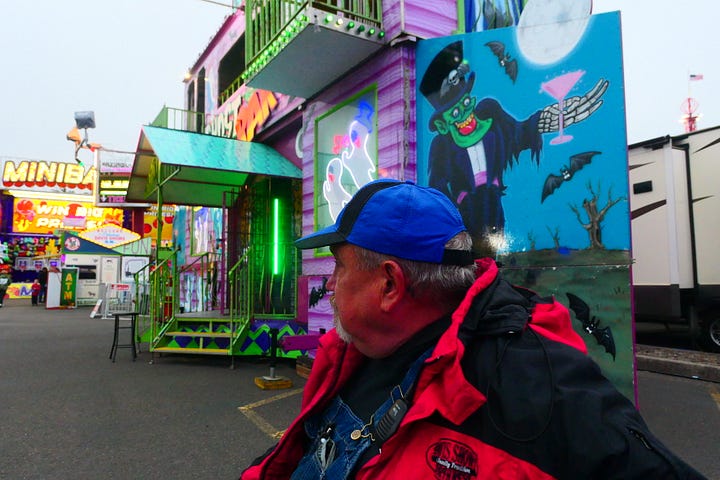
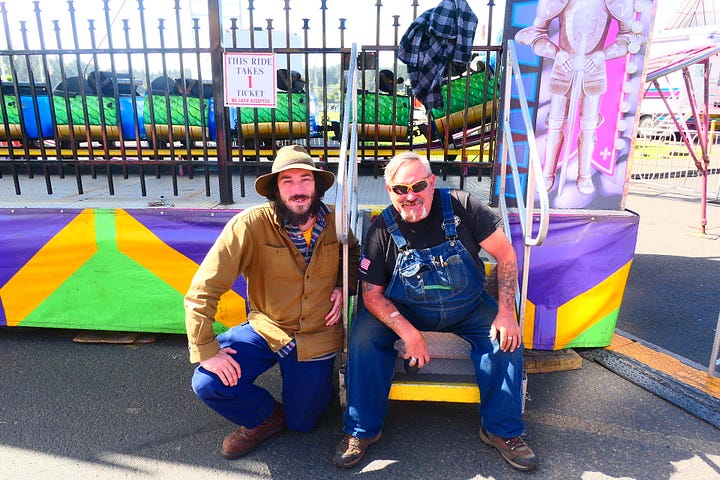
I shouldered my pack, knelt down for an awkward photograph, and departed early. I was too spooked to stick around for more strangeness. Too nonplussed with this distant, hoarse-voiced, rough, sad, empty man. I’m not sure what I expected — a Hallmark Movie plotline? — but I hadn’t exactly anticipated such a disillusioning sense of dislocation and cold grief.
Days later, on the train east from Portland — toward home and freedom from the desolate mirage of the wide, aimless West — a sweet, brilliant middle–aged woman asked me a simple question after I had related the whole tale:
“Do you forgive him?”
I only said this: “How can one forgive an animal for what he does? How can one condemn the antelope in the rut? When a human being lowers his own sexuality to that of an animal, and, cowering, remains as cold as a feral brute toward the fruit of his own loins – without honor or sentimentality or hope – what is there to forgive? Such a creature has no notion of what would be right to begin with.”
And she – an acolyte of new-age therapeutic language, employed the speech of the therapist in a manner that I found uncharacteristcally comforting: She only said “that sounds harsh – but it does not seem to me like you have said anything wrong.”
Now, in only eight days, I will marry and be a husband to
. God willing, we will be parents soon – and I will be a father. May the Lord protect me as I go forth into this new life, to serve the bright-eyed infant souls who shall know this world first through our words and hands – may He have the mercy to guide us as parents, and to guide me far from the path of my own father.For now, as my train rolls eastward — I know exactly what not to do.





This is perhaps not the right reaction to such a personal essay, but I just have to say that I am a compulsive reader of all kinds of literature since childhood and more recently a Substack addict and have very high standards and WOW HOLY SHIT this is an absolutely tremendous piece of writing. You do sometimes have an issue with overwriting - excessive length or descriptive overenthusiasm - but here your voice feels disciplined just enough by the gravity of events and emotion. Words are cheap in the age of the internet but this essay carries so much weight.
Two quick questions/observations.
First, have you ever read Thomas Wolfe? I’m rereading Look Homeward Angel and something about you reminds me of a very 21st century (hence, very different but somehow reminiscent) version of him.
Second, for some reason reading this essay your brief description of your grandmother and her house in Rome, New York kept coming to mind. I’m not sure why except that person and setting seemed so diametrically and completely and profoundly opposite from your father in every way that it was astounding that they could be part of the same life and same country. Perhaps related to your juxtaposition of east and west. Anyway not sure what I’m saying here but noting it.
Wow, what a pre-marital rumspringa this was!!! I feel like the line "zombified wenches in polyester mini-skirts" was written for my amusement alone haha!
This was such a beautiful, wrenching article. I pray that your father will discover his soul and find peace. I am soo grateful for who you are, though, and I'm certain beyond a doubt that you will be the best possible father ever to our children!!